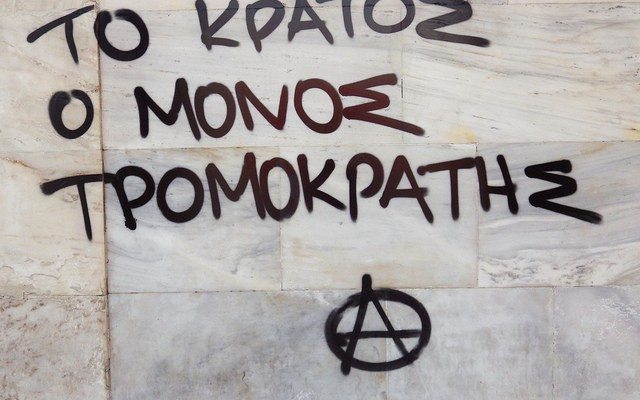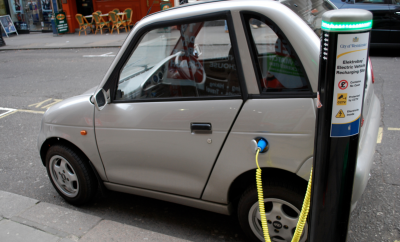
Society and Culture
Graffiti Marks Turning Point in Greek Economy
On Friday, August 1, Moody’s Investor Service upgraded Greece’s government bond rating, indicating subtle economic growth for a country hit hard by the 2008 economic crisis. Plagued by structural weakness, along with a decade of mounting financial deficits, the Greek economy floundered from the outset of the 2008 recession, afflicting the Eurozone system until it was saved from the brink of bankruptcy in 2010. Eurozone countries and the International Monetary Fund have pumped 240 billion euros ($308 billion) in the Greek economy, floating the feeble country on the promise of exacting austerity measures including drastic cuts to public spending that have triggered unprecedented levels of poverty, decimating incomes and pushing the unemployment rate to 27 percent.
Moody’s recent vote of confidence in the Greek economy may however mark at turning point for the credit-strapped country, since the Moody’s upgrade is corroborated by other reputable credit agencies. On May 23, 2014 Standard & Poor and Fitch raised their ratings of Greece from B- to B, while Moody’s predicted a gradual decline of its massive national debt. While this credit rating remains at “junk” status, or below investment grade, Greece’s economy is projected to grow by 1.2 percent, the first significant uptick in seven years signaling that the country is near the end of its dismal recession.
If graffiti in Athens can tell us anything about this recent optimism, it is that Greece’s impending resuscitation has not come without its social costs. Moreover, the capitalist “invisible hand” is not the only hand of consequence. In July, preceding Moody’s report of Greece’s economic health, iNO, a Greek graffiti muralist, unveiled his latest piece. The mural, called “Wake UP,” portrays one hand saving another that lets go of a coin. “While the economic situation in Greece remains unsettled [ne s’arrange pas],” explained the French graffiti blog ALLCITY, “iNO made a blind wall in Athens with the theme of resurrection, the hand of God bringing to life a man fascinated by money.” The black and white mural cast against dense cream concrete buildings, prescribes a redemption that necessitates letting go of money, perhaps suggesting a return to more humanitarian, social, and fiscal policies in Greece. Since the outset of the 2008 economic crisis, iNO has been at the forefront of Greek political graffiti; his murals have illuminated the social consciousness of the recession.
“People in Greece are under pressure,” iNO told The New York Times in April. “They feel the need to act, resist and express themselves… If you want to learn about a city, look at its walls. Take a walk in the center of Athens, and you will get it.” Nearly all of iNO’s murals contain a social message, whether implicitly or explicitly expressed. “No Future,” for example, depicts two faces of a baby: one searching the sky desperately, the other stares blankly at the viewer, or at the absence of future and economic promise in Athens. “System of Fraud,” shows the heads of two hellenistic statues, the bottom melting away, perhaps critiquing Athens tourism industry, or the mismanagement of its revenue. “Wake Up” in contrast, is a hopeful message, but also an admonishment against the abuses of capital.
Political graffiti has been a mainstay of dissent in Greece since the outset of the 2008 economic crisis. Activists against the government have plastered Athens’ city walls, banks, kiosks, trains, and cars with political messages like “Their Wealth is Our Blood;” commenting on international bailouts to save Greece, “Wake Up! Fight Now!;” and even sardonic graphics advertising democracy, “Super Democracy (as seen on TV)” with a figure giving a middle finger.
Graffiti has functioned as “counter-propoganda” for the Greek people who have been devastated by austerity measures and no longer trust the government. Going forward, however, graffiti will mean more than a statement of protest; as a voice of the people, political graffiti will play a role in discussions about the restoration of the Greek economy and society. The upgrade of Greece’s credit rating marks a turning point for the Greek economy. Will Greece resume the self-destructive path of government corruption and financial mismanagement, or will the country espouse more humanitarian policies, shifting emphasis from boosting private investors to a more robust welfare for its people? If anything is clear, it is that Graffiti will remain part of the equation.
—
Ryan D. Purcell (@RyanDPurcell) holds an MA in American History from Rutgers University where he explored the intersection between hip hop graffiti writers and art collectives on the Lower East Side. His research is based on experience working with the Newark Public Arts Project and from tagging independently throughout New Jersey and New York.
Featured image courtesy of [aesthetics of crisis via Flickr]








Comments